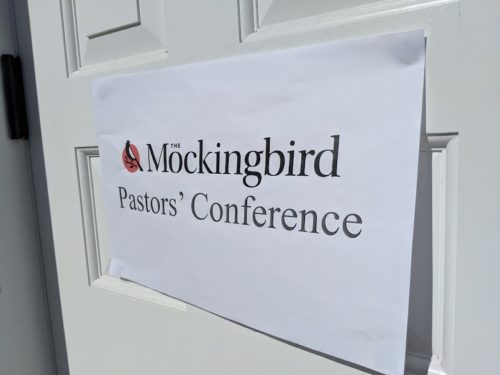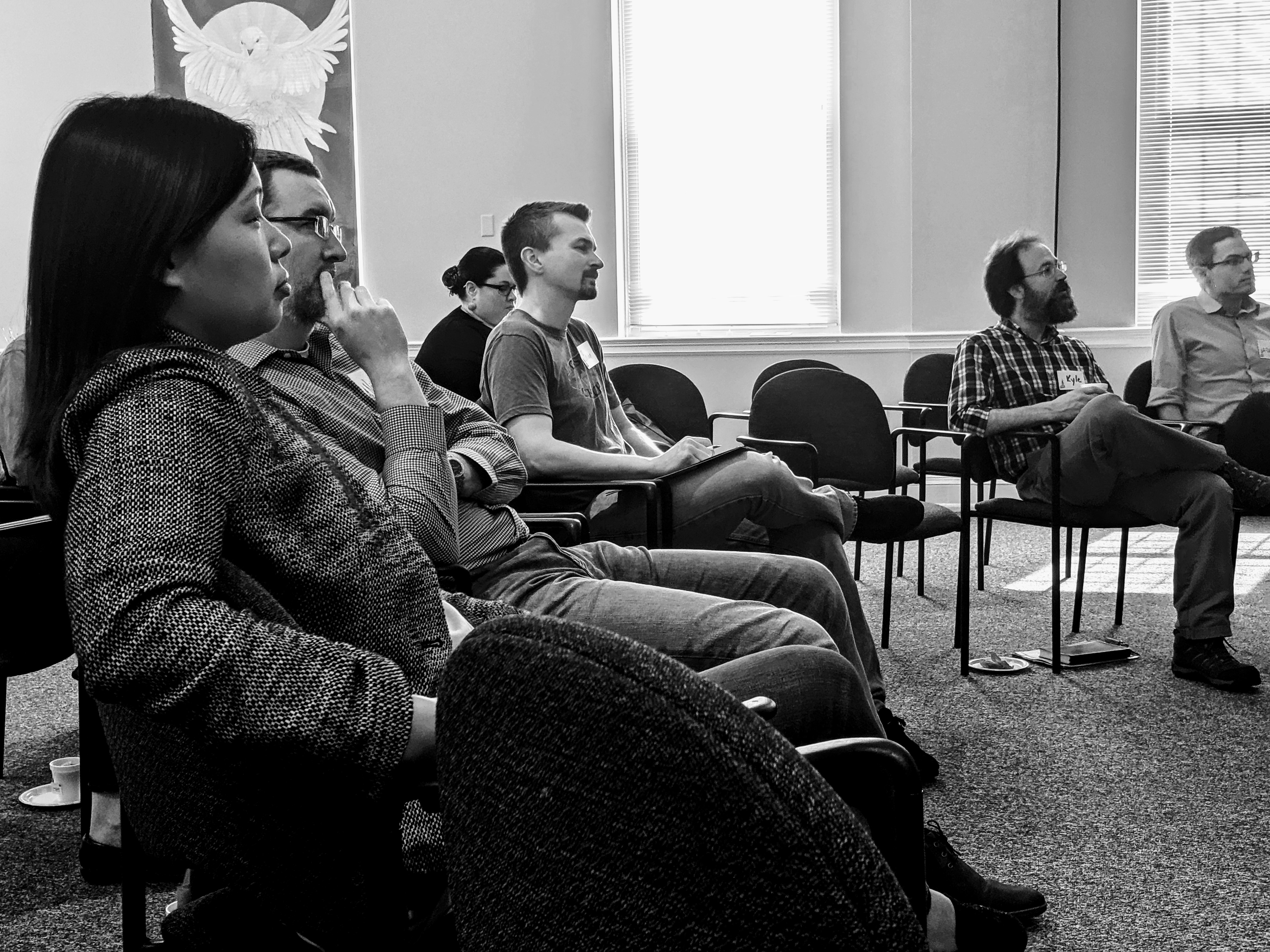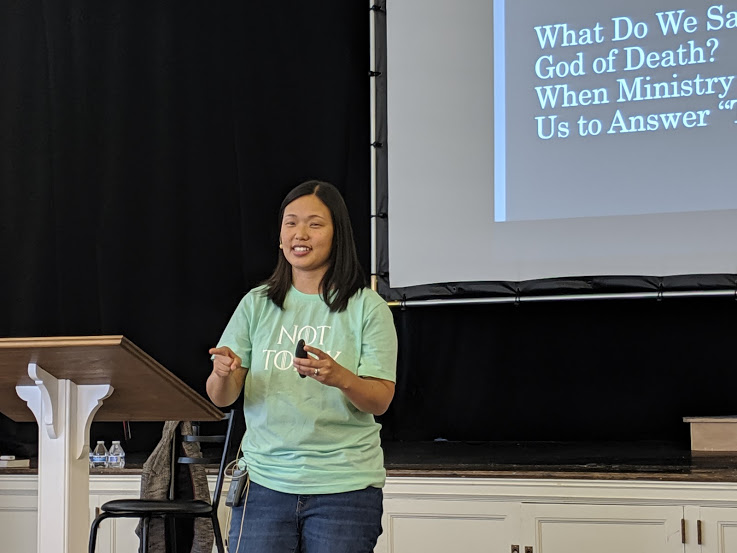

More notes and photos below from #MbirdLancaster19!
1. Fresh off the press from this morning, The Atlantic gives us new language to describe the law: “The Unfunded Mandate.” When the federal government requires states to abide by certain rules without providing the funding needed to support that rule, it’s called an Unfunded Mandate. Stay tuned, though — in the same way that Jesus’s conversations about debt were about something deeper, the language of The Unfunded Mandate finds itself applying to the “little-l laws” surrounding parenting.
“Unfunded mandate” refers to situations where the federal government requires states to do something, but doesn’t provide them with the money. Unfunded mandates create complications; money to pay for the mandated programs must come from somewhere, usually from other programs. This term from the world of governance is a good lens through which to understand modern parenting, which comes with a lot of rules (a lot of mandates) but not a lot of help (funding).
In pregnancy: Don’t eat this list of foods, drink this list of beverages. Sleep on your side. Don’t go skiing or engage in contact sports. Gain exactly 25 to 35 pounds. And then the baby arrives: Breastfeed exclusively until six months, continue to a year. Give them allergens as soon as you can. And, yes, if you have to use formula, mix it with boiling water.
But resources are finite. There are only 24 hours in a day. If you spend an extra hour boiling water to mix formula, that hour isn’t spent doing something else. It might be impossible to do everything that the medical and child-care establishments (Big Baby?) tell you to do as a new parent. And yet by framing each recommendation as an imperative, Big Baby provides little guidance for how to choose among them when you are constrained.

#MbirdLancaster19
The article couldn’t have been more relevant to yours truly — my wife and I are expecting our first in November (your notes of congratulation are welcome in the comment section below!). And we’re already feeling the pinch — a few paragraphs from What to Expect When You’re Expecting have already sent us into a tailspin trying to remove all plastics from our life, especially microwaveable plastics. Talk about an unfunded mandate! When we asked other couples how they navigated the anti-plastic parts of the book, they responded in hushed tones, “just do the best you can and try not to worry too much.”
When it comes to the laws of parenting, my experience four months into our own parent preparation has been surprisingly theological. These are laws that demand more than we/I can give, and the result is crushing. To use the oft-quoted poem:
To run and work the law commands, but gives us neither feet nor hands.
A sweeter word the Gospel brings. It bids us fly and gives us wings.
Who’d have thought this short verse would dovetail so nicely with a column in The Atlantic?
2. If the law is an unfunded mandate, it also increases the trespass. So saith the New York Times, whose profile of Orthosomnia, “right sleep,” details the changes in the field of sleep health through the introduction of sleep trackers. The article’s thesis is that sleep trackers like Fitbits and Apple Watch are not only unreliable, but also create anxiety about poor sleep that leads to, no surprise, poor sleep.
But no matter how accurate a sleep tracker is, he said, it is only a tracker. It cannot by itself improve sleep. He made an analogy to a bathroom scale: “If you stand on it every day, it will not make you lose weight.”…Dr. Khosla said that she had seen patients with trackers neglect the basics of sleep hygiene, like following a regular schedule and avoiding screens before bedtime.
“People will shell out 200 bucks for some sleep device, but we’re not willing to just shut off our phones and go to bed,” she said.
If anything, the unreliable technology found in sleep tracking tech and the cultural imperative to sleep well for productivity’s sake takes away from the peace and assurance that actually helps one fall asleep. Somewhere in all this, there’s a witty turn of phrase about counting sheep verses being counted among The Good Shepherd’s sheep.

#MbirdLancaster19
3. Pure #Seculosity coming this week from David Brooks, whose column highlights the rise of astrology and the occult among young adults. The religious impulse is going to find an outlet one way or another, so there’s little surprise that astrology and the occult are on the rise. Listing many reasons why he finds the trend of Wicca and astrology understandable but unsustainable, here are his thoughts on organized spirituality in the new age:
Fifth is the desire to live within a coherent creed and community, but without having that creed impinge on your individual autonomy. Being an Orthodox Jew is a thick but binding life. The emerging spirituality is a hodgepodge spirituality. Each person borrows practices from, say, Native American, Buddhist, Christian, Jewish and SoulCycle traditions and blends them in a way he or she finds moving. There is no grand narrative, no specific way one is expected to live, no set of laws you have to obey or even a specific cult leader who might boss you around. Religion bows before individualism.
Finally, many people seem to want to be alternative without actually leaving the mainstream world… Even the occultists are not really that countercultural. For example, David Salisbury’s book “Witchcraft Activism: A Toolkit for Magical Resistance” is surprisingly normal. Salisbury gives standard advice on how to be an activist. It’s just that he asks you to say a prayer to Hermes, the messenger god, when you send an important email.
I doubt that much of this will be sustainable. I doubt it’s possible to have tight community and also total autonomy, that it’s possible to detach spiritual practices from the larger narratives and cultures and still have something life-shaping. But society is groaning. New forms are coming into being. We really are living through a moment of major transitional change.
Color me fascinated that, according to the article, “Wicca, by that estimation, is technically the fastest-growing religion in America.” The ‘religious impulse’ is the real deal folks — and there’s some relief that the religious impulse here is directed at, well, something like religion, as opposed to the already mentioned pseudo-religions of parenting, productivity, etc. At least the astrologers are in a place where, when the stars are rightly aligned, they’ll find themselves in Bethlehem.
4. Way back in 2012, cult classic TV show Community featured a one-off character named Blade, a carnival worker whose laid-back demeanor and devil-may-care charm made him irresistible to the show’s cast. His secret? A loose bolt flew off of a Ferris Wheel and destroyed the part of his brain that made him care what other people think. It’s a great gag that flummoxes the show’s leads.
Maybe that’s why I’ve found The Hustle’s profile of San Francisco chef Davide Cerretini so fascinating. The chef grew frustrated at Yelp’s infamous strong-arm advertising tactics and, in an act of pure rebellion, asked his restaurant patrons to give him 1-star reviews and blow up the system.
In 2014, chef Davide Cerretini advertised a special that would forever change his fate: Anyone who left his restaurant a 1-star review on Yelp would get 25% off a pizza.
See, his Bay Area-based Italian joint, Botto Bistro, was at a crossroads. Like many small businesses, it was enslaved to the whims of online reviewers, whose public dispatches could make or break its reputation.
He’d had enough: It was time to pry the stars from the “cold, grubby hands of Yelpers” and take control of his own destiny.
But the move would set Cerretini at the center of a long-standing battle between Yelp and disgruntled business owners — a battle including cries of “extortion,” review manipulation, and predatory advertising tactics.
Judgment like this will always cause people to snap and rebel. I, too, would seek to blow up whatever system consistently (and unfairly!) told the world about my own shortcomings. Yours truly worked in food service for a spell and, given my own experience with Yelp’s telesales team, I am inclined to believe Chef Cerretini. Even if he’s now a minor chef celeb, I’m jealous of his foresight to monetize a broken system of embarrassment.
Moreover, like the cast of Community, I too find this chef magnetic. Oh to be free of the review system! As Luther once quipped, “the quest for glory is satisfied not in achieving it, but extinguishing it.”
Also on the funny side: Hate Clicks Are a Major Source of Web Traffic And Also The Princess Bride Is A Trash Movie Only Stupid People Like. And a Happy Father’s Day to all the dads out there: we appreciate this gift guide from The New Yorker.

#MbirdLancaster19
5. In entertainment this week, do we really need another Toy Story? David Sims over at The Atlantic says that if we’re going to get another addition to the, erm, storied franchise, this is a good one to have. For those of you who have our Gospel According to Pixar book (a book we published nine years ago!), you know that the stories aren’t about the Toys. The first Toy Story is a parable of God’s love apart from accomplishment. Toy Story 2 is a parable about doubting God’s love and the seduction of lesser love. Toy Story 3 is a parable about God’s love at impending death. The well is deep, friends, for those with eyes to see! Toy Story 4? Sims gives us this tantalizing taste of the theology to come:
Toy Story 4 wisely feels like less of a new chapter and more like an epilogue, an addendum for Woody that muses on the peculiarities of the symbiotic relationship between toys and humans these movies have long explored. But the film’s most challenging, bizarre, and lovable material involves a beady-eyed Frankenstein’s monster named Forky (Tony Hale) who becomes the newest addition to Bonnie’s flock after she builds him in kindergarten class. His body is a plastic spork, his feet are made of broken popsicle sticks, and his hands are gnarled pipe cleaners that grasp at the air with maniacal urgency. Most important, he doesn’t know why he’s alive, and reader, that’s when I leaned forward in my seat.
A Toy Story that deals with the existential crisis of creation and the meaning of life? Bring on the popcorn and the theology blogposts!
All joking aside, the upcoming film Emanuel, a documentary about the heartbreaking shooting at Emanual AME in South Carolina four years ago, covers the other end of the theological spectrum. If the reviews are right, no pop culture references are needed here — it’s 100% grace-in-practice, on film.
6. Staying on the serious side, this article from the New York Times is fantastic: Nazis Killed Her Father. Then She Fell in Love With One:
It was 1941. Ms. Landecker was half Jewish and terrified of deportation. Her new boss, Albert Reimann Jr., was an early disciple of Adolf Hitler and described himself as an “unconditional follower” of Nazi race theory.
Somehow, inexplicably, they fell in love.
The story of Ms. Landecker, whose Jewish father was murdered by the Nazis, and Mr. Reimann, whose fervent Nazism and abuse of forced laborers did not stop his family from attaining colossal wealth after the war, is a tale of death and devotion and human contradictions. It is also a tale of modern-day corporate atonement.

#MbirdLancaster19
You’ll never eat airport Pret-a-Manger or Panera the same. Here’s where the tale gets difficult: what do you do when the offended and the offender are both in your genealogy?
Outrage has flared without the public knowing the full extent of Mr. Reimann’s Nazi convictions — and without knowing the final wrenching twist: that the history of the Reimann family is one of both victim and perpetrator. The heirs carry both sides within them. In a series of interviews with The New York Times, members of the Reimann family spoke publicly for the first time about the Nazi scandal. They disclosed the story of Emilie Landecker’s Jewish father, Alfred, and described how his murder has forced the clan to reckon not just with the past, but with the future.
7. Finally, a huge high-five to Adam Morton and the team that gathered in Lancaster PA this week for Mockingbird’s pilot pastors’ conference! As an attendee, I returned home with a fresh appreciation for church administration, a deeper appreciation for God’s role in professional failure, and a whole heap of comfort after discovering Martin Luther’s gripes about preaching to a people who didn’t want to listen. Talks forthcoming on our Talkingbird podcast. If you’re not subscribed, Apple Podcasts and Google Podcasts are a short click away.
Strays:
- DZ was on the Newsworthy With Norsworthy podcast this week. Host Luke connects the dots between his own love of crossfit and the need for a non-works based atonement, while DZ struggles with how to introduce his kids to alcohol.
- #Seculosity and death: “Mr. Gibson’s company is buying forests, arranging conservation easements intended to prevent the land from ever being developed, and then selling people the right to have their cremated remains mixed with fertilizer and fed to a particular tree.”
- A follow-up from Blake’s earlier post this week re: plastic bag shaming.
- Dan VanVoorhis over at 1517 answers the question “Do I Have to Go to Church.“
- P.S. They used God Only Knows in the Toy Story 4 trailer. They’re clearly trying to tell us something.

COMMENTS
2 responses to “Another Week Ends: Unfunded Mandates, Orthosomnia, One-Star Yelp Reviews, Lancaster Love, the Creation of Forky, and the Fastest Growing Religion in America”
Leave a Reply













Mazel Tov to you and your wife, Bryan J.~
SO excited the world gets another Jarrell!!!